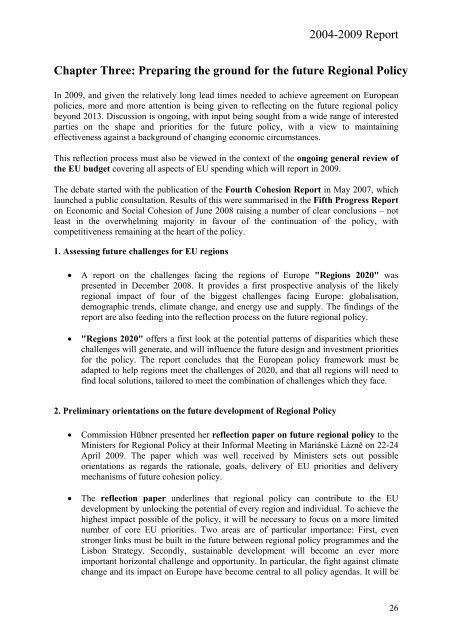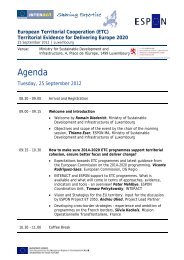Achievements of Europe's regional policy 2004-2009 - Et2050.eu
Achievements of Europe's regional policy 2004-2009 - Et2050.eu
Achievements of Europe's regional policy 2004-2009 - Et2050.eu
Create successful ePaper yourself
Turn your PDF publications into a flip-book with our unique Google optimized e-Paper software.
<strong>2004</strong>-<strong>2009</strong> Report<br />
Chapter Three: Preparing the ground for the future Regional Policy<br />
In <strong>2009</strong>, and given the relatively long lead times needed to achieve agreement on European<br />
policies, more and more attention is being given to reflecting on the future <strong>regional</strong> <strong>policy</strong><br />
beyond 2013. Discussion is ongoing, with input being sought from a wide range <strong>of</strong> interested<br />
parties on the shape and priorities for the future <strong>policy</strong>, with a view to maintaining<br />
effectiveness against a background <strong>of</strong> changing economic circumstances.<br />
This reflection process must also be viewed in the context <strong>of</strong> the ongoing general review <strong>of</strong><br />
the EU budget covering all aspects <strong>of</strong> EU spending which will report in <strong>2009</strong>.<br />
The debate started with the publication <strong>of</strong> the Fourth Cohesion Report in May 2007, which<br />
launched a public consultation. Results <strong>of</strong> this were summarised in the Fifth Progress Report<br />
on Economic and Social Cohesion <strong>of</strong> June 2008 raising a number <strong>of</strong> clear conclusions – not<br />
least in the overwhelming majority in favour <strong>of</strong> the continuation <strong>of</strong> the <strong>policy</strong>, with<br />
competitiveness remaining at the heart <strong>of</strong> the <strong>policy</strong>.<br />
1. Assessing future challenges for EU regions<br />
• A report on the challenges facing the regions <strong>of</strong> Europe "Regions 2020" was<br />
presented in December 2008. It provides a first prospective analysis <strong>of</strong> the likely<br />
<strong>regional</strong> impact <strong>of</strong> four <strong>of</strong> the biggest challenges facing Europe: globalisation,<br />
demographic trends, climate change, and energy use and supply. The findings <strong>of</strong> the<br />
report are also feeding into the reflection process on the future <strong>regional</strong> <strong>policy</strong>.<br />
• "Regions 2020" <strong>of</strong>fers a first look at the potential patterns <strong>of</strong> disparities which these<br />
challenges will generate, and will influence the future design and investment priorities<br />
for the <strong>policy</strong>. The report concludes that the European <strong>policy</strong> framework must be<br />
adapted to help regions meet the challenges <strong>of</strong> 2020, and that all regions will need to<br />
find local solutions, tailored to meet the combination <strong>of</strong> challenges which they face.<br />
2. Preliminary orientations on the future development <strong>of</strong> Regional Policy<br />
• Commission Hübner presented her reflection paper on future <strong>regional</strong> <strong>policy</strong> to the<br />
Ministers for Regional Policy at their Informal Meeting in Mariánské Lázně on 22-24<br />
April <strong>2009</strong>. The paper which was well received by Ministers sets out possible<br />
orientations as regards the rationale, goals, delivery <strong>of</strong> EU priorities and delivery<br />
mechanisms <strong>of</strong> future cohesion <strong>policy</strong>.<br />
• The reflection paper underlines that <strong>regional</strong> <strong>policy</strong> can contribute to the EU<br />
development by unlocking the potential <strong>of</strong> every region and individual. To achieve the<br />
highest impact possible <strong>of</strong> the <strong>policy</strong>, it will be necessary to focus on a more limited<br />
number <strong>of</strong> core EU priorities. Two areas are <strong>of</strong> particular importance: First, even<br />
stronger links must be built in the future between <strong>regional</strong> <strong>policy</strong> programmes and the<br />
Lisbon Strategy. Secondly, sustainable development will become an ever more<br />
important horizontal challenge and opportunity. In particular, the fight against climate<br />
change and its impact on Europe have become central to all <strong>policy</strong> agendas. It will be<br />
26







